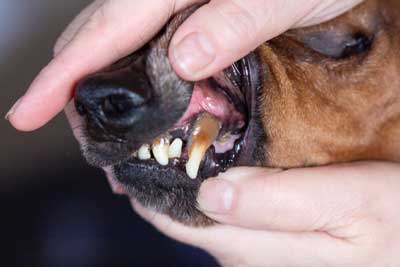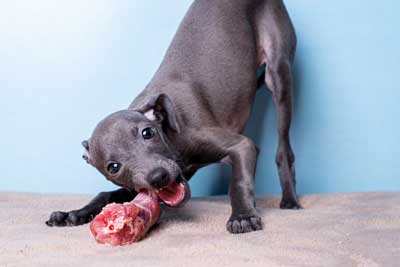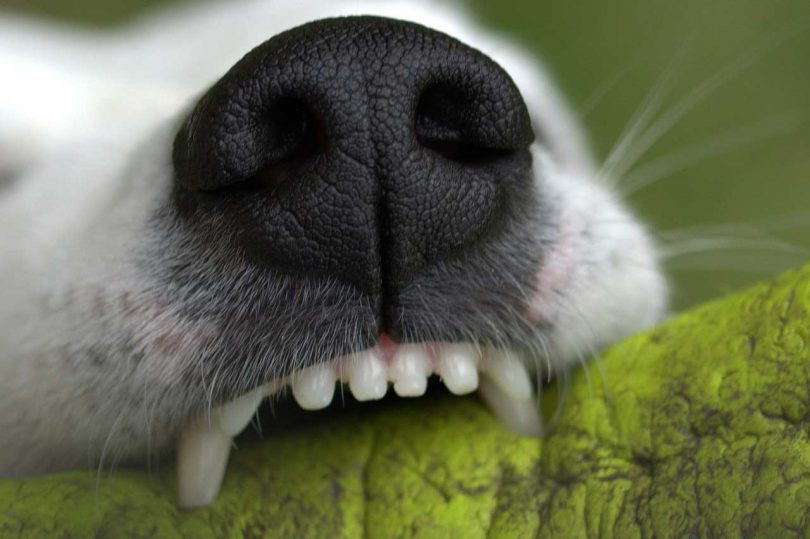Keeping Your Italian Greyhound’s Teeth Healthy
Italian Greyhounds are beloved for their sleek appearance and gentle demeanour, but like all breeds, they require proper dental care to maintain their overall health and well-being. Periodontal disease is a common issue among dogs, including Italian Greyhounds, but with the right preventative measures and proactive care, you can help keep your furry friend’s teeth and gums in top condition.
What is Periodontal Disease?

Periodontal disease is also called gum disease, and is a serious gum infection that damages the soft tissue around teeth. It usually is seen after years of development of plaque, tartar, and gingivitis. It is irreversible and results in permanent loss of tooth support. The upper teeth are affected more severely than the lower teeth, and the cheek surfaces of the teeth tend to have have more disease than the surfaces near the tongue. Gingivitis is often first noticed at about 2 years of age but improves if treated. Periodontitis usually begins at 4 to 6 years of age.
Without treatment, periodontal disease can destroy the bone that supports your dog’s teeth. This can cause your dog’s teeth to loosen and lead to tooth loss.
Preventing Periodontal Disease:
1. Daily Brushing: Just like humans, dogs benefit from rdaily tooth brushing. Use a soft-bristled toothbrush and dog-friendly toothpaste to gently brush your Italian Greyhound’s teeth daily. Start slowly and gradually increase the frequency as your dog becomes accustomed to the routine.

2. Dental Chews and Toys: Provide your dog with dental chews and toys designed to promote oral health. Chewing helps remove plaque and tartar buildup from your dog’s teeth, reducing the risk of periodontal disease. Look for products approved by veterinary professionals and avoid items that could pose a choking hazard.
3. Balanced Diet: Nutrition plays a crucial role in your dog’s overall health, including their dental health. Choose high-quality dog food that is formulated to support dental health, and avoid feeding table scraps or sugary treats that can contribute to tooth decay.
4. Regular Veterinary Check-ups: Schedule routine dental examinations with your veterinarian to monitor your Italian Greyhound’s oral health. Your vet can identify early signs of periodontal disease and recommend appropriate treatment and preventative measures.
Bones, particularly cooked bones, are not recommended as chew toys for Italian Greyhounds or any dog breed due to several reasons:
1. Risk of Dental Fractures: Bones, especially cooked bones, can be extremely hard and may cause dental fractures or broken teeth when chewed on by dogs. Italian Greyhounds have delicate jaws and teeth, making them particularly vulnerable to dental injuries.
2. Choking Hazard: Bone fragments can break off during chewing and pose a choking hazard, especially for smaller breeds like Italian Greyhounds. These fragments may also become lodged in the throat or gastrointestinal tract, leading to serious complications or even requiring surgical intervention.
3. Gastrointestinal Issues: Consuming bones, particularly cooked bones, can lead to gastrointestinal problems such as blockages, perforations, or irritation of the digestive tract. These issues can result in vomiting, diarrhoea, abdominal pain, and other symptoms requiring veterinary attention.

4. Nutritional Imbalance: While raw bones may provide some nutritional benefits, they can also upset the balance of a dog’s diet if not fed in moderation. Excessive consumption of bones may lead to imbalances in calcium and phosphorus levels, potentially causing skeletal abnormalities or other health issues over time.
For these reasons, it’s safer to provide your Italian Greyhound with chew toys specifically designed for dental health, such as dental chews or rubber toys, rather than bones. Always supervise your dog during chewing activities and choose products that are appropriate for their size and chewing habits to minimize the risk of injury or ingestion of harmful substances. If you have any concerns about your dog’s dental health or chewing habits, consult with your veterinarian for guidance on safe and suitable chew options.
Caring for Your Dog’s Teeth and Gums:
1. Professional Cleanings: In addition to at-home care, your Italian Greyhound may benefit from professional dental cleanings performed by a veterinarian. These cleanings involve scaling away plaque and tartar build-up, as well as polishing the teeth to prevent future accumulation.
2. Monitor for Signs of Dental Problems: Keep an eye out for signs of dental issues, such as bad breath, swollen or bleeding gums, loose teeth, or reluctance to eat. If you notice any of these symptoms, consult your veterinarian promptly for evaluation and treatment.
3. Supplements: Certain supplements, such as dental water additives or oral hygiene gels, may help maintain your dog’s oral health between cleanings. Consult with your vet to determine if these products are suitable for your Italian Greyhound.
Managing Periodontal Disease:
If your Italian Greyhound is diagnosed with periodontal disease, your veterinarian will recommend a treatment plan based on the severity of the condition. Treatment options may include:
1. Professional Scaling and Root Planing: In cases of advanced periodontal disease, your dog may require a more intensive dental procedure known as scaling and root planing. This involves cleaning beneath the gum line to remove bacteria and diseased tissue.

2. Antibiotics: Your vet may prescribe antibiotics to control infection and inflammation associated with periodontal disease. Follow your vet’s instructions carefully regarding dosage and administration.
3. Pain Management: Periodontal disease can be painful for dogs, so your veterinarian may recommend pain management strategies to keep your Italian Greyhound comfortable during treatment.
4. Ongoing Home Care: Following treatment, it’s essential to continue with daily at-home dental care to prevent recurrence of periodontal disease.
By prioritising your Italian Greyhound’s dental health and implementing preventative measures, you can help keep their teeth and gums healthy throughout their life. Remember to consult with your veterinarian for personalized advice and recommendations tailored to your dog’s specific needs. With proper care, you can ensure that your Italian Greyhound enjoys a happy, healthy smile for years to come.
Joanne Liddy
The Royal Kennel Club’s Breed Health Coordinator for the Italian Greyhound









